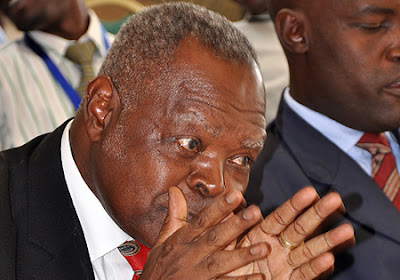Managing
Director of Uganda Veteran Investment Company, Chris Mudoola before the
Gender committee of Parliament to respond to queries relating to the
mistreatment of girls who were working in Iraq.Photo by Rogers Okwanyi
Uganda women in Iraq
claim their body parts were sold
Publish Date: Feb 13, 2013
By Moses Walubiri & Paul Kiwuwa
The horror story that is the alleged humiliation and oppression that Ugandan women who were taken to Iraq by a labor exporting firm endured, took another twist yesterday with allegations that some of them had their body parts forcefully harvested and sold by their employers.
These girls are part of the over 120 taken to Iraq by Col.
Chris Mudoola's Uganda Veterans Development Ltd (UVDL) before
its license was revoked in 2009 by ministry of gender following
numerous complaints about maltreatment of Ugandan workers in Iraq.
MPs on the Gender, Labor and Social Development said three
girls have registered their complaints with them as the committee plans to send
a delegation to Iraq
in the first week of March to verify their allegations.
In their recent submission to the committee, the young women
contend that their employers might have profited from their body parts,
complaining of going under the surgeon's knife without their consent.
However, when asked about the veracity of these claims,
Mudoola almost lost his cool, telling legislators to conduct another thorough
medical examination on these women to settle the issue.
"If body parts are removed, do they grow? Let these
girls be subjected to a second medical examination," a tad riled Mudoola
said, as Flavia Kabahenda (Kyegegwa) told him to maintain courtesy in his
interface with legislators.
"You're a Colonel, but this is not a military council.
Let Col. Mudoola respect MPs as he tries to make his submission,"
Kabahenda said.
The first medical examination on these women was conducted
in 2010 on the orders of then gender minister, Dr. Emmanuel Otaala.
However, the medical reports were neither availed to UVDB
directors nor to the complainants, which has forced the women to demand for
another examination.
The women who were lured to Iraq with promises of plum jobs
petitioned parliament last year calling for a probe into the operations of
UVDL.
Besides, they have also sued government and UVDL seeking
compensation for their Iraq
ordeal.
In their petition, the girls allege that they were never
paid any penny for the time they spent working as maids in Iraq, with their
employers assuring them that they had been bought for USD$3500 (about sh9m)
from UVDL.
However, UVDL director Kabagambe Ruguusha refuted claims by
the women that they ended up working as maids instead of manning different
facilities on American bases in Iraq,
saying all the girls had signed contracts where they consented to their terms and
conditions of work.
"All job applicants knew exactly what they were going
to do," Kabagambe said, admitting that the tales of rape, torture and
electric shocks allegedly endured by the women "bewildered"
him.
MPs heard that only 12 people UVDB took to Iraq are still working in the Middle
East country of their own accord.
The plight of these girls first came to the public sphere in
early 2011, when an American marine in Iraq, Lt Col. Theodore Lockwood,
rescued 14 women from alleged sex slavery.
